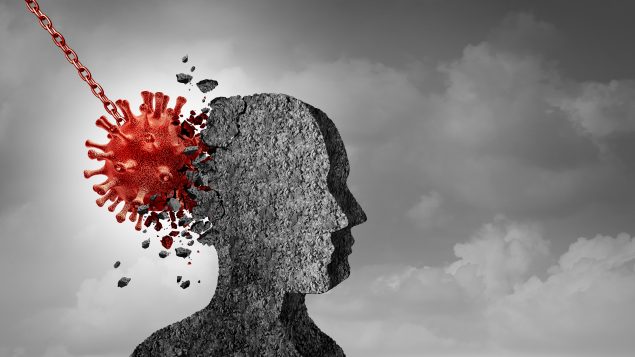Different possible reactions in the context of a pandemic linked to the coronavirus (COVID-19)
The current coronavirus pandemic (COVID-19) is a special and unusual reality. This can affect people physically, but also psychologically. Indeed, in such a context, many people will experience reactions of stress, anxiety and depression. This page is intended as a tool to help you minimize the impact of such reactions in your life.
What is stress?
Stress is a normal physiological response to an abnormal situation; it is an integral part of our existence. It allows our body to adapt to the multiple positive or negative events that we experience, such as a birth, a marriage, the loss of a job, etc. Stress comes and goes on its own, depending on whether you are in the presence of stressors or not (for example, if you are stressed at work, but if this stress subsides in the evening or on weekends, you might think that stressors are related to your work).
What is anxiety?
Unlike fear, which is a response to a definite and very real threat, anxiety is a response to a vague or unknown threat. Anxiety manifests itself when we believe that a dangerous or unfortunate event may occur and that we anticipate it. Each person can experience anxiety in varying degrees and intensity. His perception of the event will have a great influence on the intensity of the anxiety experienced.
What is depression?
According to the Multidictionary of the French language , “depression is a passing state of weariness, discouragement and sadness”. Depression can manifest itself in different ways, both physically and psychologically, and its intensity varies from person to person.
Possible manifestations related to stress, anxiety and depression
Stress, anxiety and depression reactions can manifest themselves in several ways in a person, and this, on various planes (physical, psychological, emotional, behavioral).
On the physical plane
- Headache, tension in the neck, gastrointestinal problems, etc.
- Sleep difficulties
- Decreased appetite
- Decreased energy, feeling tired
- Etc.
Psychologically and emotionally
- Concerns and insecurity related to the virus
- Feeling overwhelmed by events, helplessness
- Having an interior speech is not always a reflection of reality
- The negative view of everyday things or events
- Presence of feelings of discouragement, insecurity, sadness, anger
- Etc.
Behaviorally
- Difficulty concentrating
- Irritability, aggressiveness
- Tears
- Isolation, withdrawal
- Difficulty making decisions
- Increased use of alcohol, drugs and medication
- Etc.
Some ways to improve the situation
All of these manifestations related to stress, anxiety and depression are normal in the context of a pandemic. Most people have the resources and the ability to adapt to this type of situation. First, count on your usual ways of adapting to difficult situations. Here are other ways to help you minimize the impact of these reactions in your daily life.
Get informed
Lack of information or conflicting information can increase these reactions.
- Learn from reliable sources of information, in particular by consulting the Coronavirus page (COVID-19).
- Beware of sensational news from little known or dubious sources; take the time to validate the information with recognized official sources;
- While it is important to be properly informed, limit the time you spend looking for information about COVID-19 and its consequences, as overexposure can help increase your reactions to stress, anxiety or depression.
Take care of yourself
- Stay alert to your feelings, emotions and reactions, and give yourself permission to express them to someone you trust or to express them through writing, physical activity, or otherwise;
- Practice a physical activity that allows you to relieve your stress and eliminate your tensions;
- Adopt healthy lifestyle habits such as eating well and getting enough sleep;
- Limit the factors that cause you to stress;
- Treat yourself to small pleasures (for example, listening to music, taking a hot bath, reading, etc.);
- Stay in touch with people who do you good;
- Remember the winning strategies that you have used in the past to get through a difficult time;
- Build on your personal strengths;
- Set your limits (for example, refuse a task that you do not want to do and that is not essential);
- Learn to delegate and accept help from others (for example, asking children to do the dishes).
When does it become necessary to seek help?
In general, it is possible to overcome reactions of stress, anxiety and depression. On the other hand, it may be that after a certain time (weeks or months), the discomforts persist and worsen. The following signs may be an indicator that your condition is getting worse.
The presence of several of these signs can demonstrate that your personal resources no longer allow you to manage your daily worries. It may then be beneficial for you to seek help.
On the physical plane
- Feeling of suffocation, heart beating faster, dizziness, nausea
- Significant sleep difficulties
- Decreased appetite, which may be associated with weight loss
- Lack of energy and marked fatigue, exhaustion
Psychologically and emotionally
- Invasive anxiety and fears
- Panic when you hear about the virus
- Invasive negative thoughts
- Loss of pleasure and lack of interest in activities you used to enjoy
Behaviorally
- Difficulty taking on daily tasks
- Avoidance of anyone outside the house due to fear of contagion
- Constant monitoring of symptoms related to the virus
- Intense and frequent crying
- Marked irritability and aggressiveness, conflicts with those around them
- Lack of concentration
- Alcohol, drug or medication abuse


